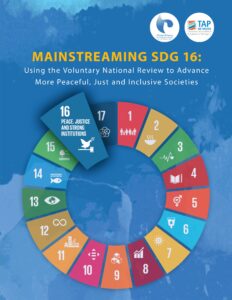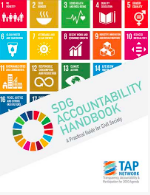National Human Rights Institutions can play a key role in advancing peaceful, just and inclusive societies through their core functions and other actions that support the SDGs
National Human Rights Institutions (NHRIs)1 are independent State bodies with a constitutional or legislative mandate to protect and promote human rights. They have a wide range of functions including undertaking systematic analysis of the human rights situation in their respective country, issuing reports and recommendations, advising government and parliament, promoting human rights education and cooperating with national, regional, international and intergovernmental organizations. Some NHRIs also have the authority to handle complaints from citizens, facilitating access to justice, redress and remedy for human rights violations.2
The global indicator framework for the SDGs recognizes the existence of independent NHRIs in compliance with the Paris Principles3 as the indicator to measure progress on SDG target 16.a.4 As of May 2021, 117 NHRIs were accredited by the Global Alliance of National Human Rights Institutions (GANHRI), with 84 in full compliance with the Paris Principles (“A” status) and 33 in partial compliance (“B” status).5 Through their core functions, NHRIs also directly contribute to the realization of other SDG16+ targets including SDG target 4.7 (human rights education) and SDG targets 5.c, 10.3 and 16.b (elimination of discriminatory legislation).6
NHRIs are a critical part of the institutional architecture necessary for the realization of the 2030 Agenda7 and can play a key role in advancing peaceful, just and inclusive societies. In line with the Mérida Declaration on the Role of National Human Rights Institutions in implementing the 2030 Agenda for Sustainable Development,8 NHRIs can take the following actions in support of SDG16+:9

The Paris Principles mandate NHRIs to work closely with civil society, promoting cooperation and coordination to enhance the protection and promotion of human rights. In line with the Mérida Declaration, there are a number of ways that you can engage with NHRIs in order to advance peaceful, just and inclusive societies, including the following:
Case Study


Case Study
The Commission on Human Rights and Administrative Justice of Ghana: An Accountability Actor
The Commission on Human Rights and Administrative Justice (CHRAJ or the Commission) is Ghana’s National Human Rights Institution. CHRAJ is a member of the multi-sectoral SDGs Implementation Coordination Committee (ICC) of Ghana, which comprises representatives of key ministries, public agencies and civil society organizations. The mandate of the ICC includes strengthening cross-sectoral coordination and multi-stakeholder partnerships in SDG implementation, monitoring, evaluation and reporting. For the preparation of Ghana’s 2019 VNR, the CHRAJ was formally requested by the SDG coordinating secretariat to provide information on its activities contributing to the SDGs, including on Goal 16. The Commission was also part of Ghana’s official delegation to the HLPF that year.
In the follow-up to the VNR, the CHRAJ is playing a central role in improving accountability in the country, particularly in its capacity as the coordinating body for the National Anti-Corruption Plan. In this role, the Commission is convening a number of thematic international and national dialogues with relevance to advance issues related to SDG 16, such as promoting the relevance of linking human rights in anti-corruption efforts to, for example, strengthen institutions, ensure rule of law and access to justice, and design adequate policies for asset recovery and return.
Among other initiatives, the CHRAJ organized a national Conference on Anti-Corruption and Transparency, which gathered high-level officials (including Ghana’s Vice-President), key representatives from the governance and justice sectors, civil society, the UN and the private sector. Participants reviewed existing policies and strategies and agreed on measures to strengthen institutions involved in fighting corruption and ensuring transparency and accountability.
Further, in January 2020, the Commission organized a national forum involving key accountability institutions including the offices of the Attorney-General, Auditor-General and Special Prosecutor, as well as the Economic and Organized Crime Office, Narcotics Control Board, Police Service and others. The forum was meant to strengthen inter-institutional collaboration and information-sharing and led to the signing of a Memorandum of Understanding (MOU) among these actors to fulfil this purpose.
Finally, on a project funded by the World Bank and expected to start in the second half of 2020, the CHRAJ was selected as one of 16 public sector institutions to promote good governance and access to a redress or remedy through internal complaint or grievance handling mechanism within the public services. The CHRAJ, in exercising its constitutional mandate as Ghana’s Ombudsman, will provide capacity-training for public officials on Client Service Charters and effective complaint handling to strengthen public services in contribution to the government’s public sector reform strategy.
Mainstreaming SDG 16: Using the Voluntary National Review to Advance More Peaceful, Just and Inclusive societies (Global Alliance and TAP Network, 2020)
This resource provides policy guidance, case studies and good practices on advancing SDG 16 implementation at national and subnational levels by more effectively leveraging the Voluntary National Review (VNR) and post-VNR processes. It contains a chapter on ‘National Human Rights Institutions in the Implementation of SDG 16.’ Available at: https://www.sdg16hub.org/topic/mainstreaming-sdg-16-using-voluntary-national-review-advance-more-peaceful-just-and-inclusive

SDG Accountability Handbook: A Practical Guide for Civil Society (TAP Network, 2018)
This handbook provides guidance on the different approaches and steps that can be taken by civil society to ensure national government accountability for the SDGs. It includes a chapter on ‘Engaging with National Human Rights Institutions (NHRI).’
Available at: https://sdgaccountability.org/

The international association of National Human Rights Institutions (NHRIs) that seeks to promote and strengthen NHRIs and provide leadership in the promotion and protection of human rights.
Available at: https://ganhri.org/
This toolbox seeks to enhance the capacity of NHRIs to contribute to the implementation, monitoring and review of the SDGs. It compiles resources from relevant organizations, covering a wide range of thematic areas and issues pertinent to specific regions and stakeholders.
Available at: https://ganhri.org/sdgs-toolbox/
This compilation of good practices for SDG monitoring and programming showcases the contributions from a range of different NHRIs to achieve the SDGs. Good practices are highlighted in relation to the following topics: monitoring and advisory; alliances and participation; data; and the practical application of a human rights-based approach to specific SDGs (including Goals 5 (gender equality), 8 (decent work and economic growth) and 16).
Available at: https://www.humanrights.dk/publications/national-human-rights-institutions-driving-force-sustainable-development
This short paper – prepared in connection with a Human Rights Council session in March 2019 to collect and share NHRI expertise and experiences – discusses the role of NHRIs in the good governance and institutional accountability architecture necessary to achieve the SDGs.
Available at: https://www.humanrights.dk/publications/national-human-rights-institutions-accelerators-guarantors-indicators-sustainable
This study outlines how NHRIs support the implementation of the SDGs at the country level.
Available at: https://www.humanrights.dk/publications/national-human-rights-institutions-engaging-sustainable-development-goals
This declaration – the outcome of the 12th International Conference of the International Coordinating Committee of National Institutions for the Promotion and Protection of Human Rights (ICC) held in 2015 – outlines the role of NHRIs in the implementation of the 2030 Agenda for Sustainable Development.
Transparency, Accountability &
Participation (TAP) Network
Address: 205 E 42nd St.
New York, NY 10017
Email:
[email protected]